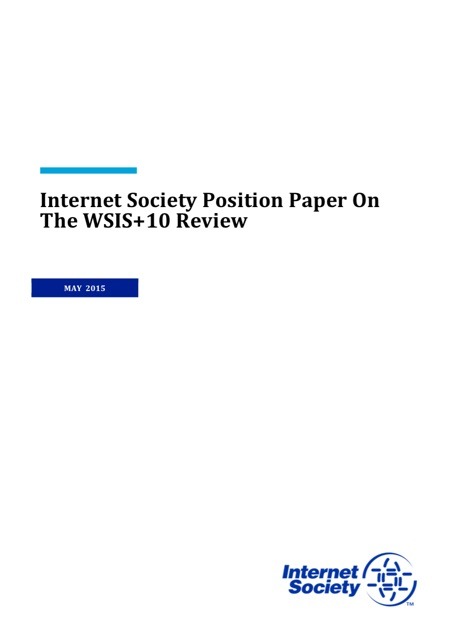The Internet Society and the WSIS+10 Review
The WSIS+10 Review Process marks the ten-year milestone since the World Summit on the Information Society (WSIS). The WSIS was a two-phase summit (2003-2005), which defined the issues, policies and frameworks to tackle information and communication technologies (ICTs) to foster development. In 2015, the process will culminate with a high-level meeting of the UN General Assembly in December that will set course for the WSIS beyond 2015. The Internet Society is concerned that the preparatory process may not be as open and inclusive as needed.
As one of the organizations involved in the WSIS since its inception, the Internet Society is following the WSIS+10 process closely and participating to the greatest extent possible. In particular, the Internet Society is gathering information and sharing with its members and community. We are also planning a series of outreach sessions in collaboration with other stakeholders in the lead-up to the December event.
Below, we set out a positive vision for the WSIS+10 Review that reflects the progress made since 2005; the challenges still before us to build a truly global information society; and the benefits of an open and inclusive dialogue both during and leading up to the High Level WSIS+10 event.
Collaborative Networks for Human empowerment and Sustainable Development
- ISOC believes the WSIS 2015 Review is an opportunity to celebrate the progress made over the past decade: the development of Internet infrastructure around the globe has accelerated economic growth and social development on all continents.
- This success is due to the openness of the Internet ecosystem, which includes all stakeholders. It builds on enhanced cooperation among governments, business, civil society and the technical community, and the multiplication of tangible multistakeholder partnerships to implement the WSIS Action Lines (Access, Security, etc.).
- While affordable and widely available access is an essential foundation and should remain a primary objective of the WSIS review, ISOC also believes it is essential the WSIS review showcases how Internet access and ICTs enable meaningful opportunities for human empowerment.
- An Internet experience based on trust and the respect of Human Rights online is a necessary pillar in order to reap the full benefits that the Internet can offer.
- ISOC believes that there is value in finding synergies between the WSIS process and the adoption of new U.N. Sustainable Development Goals (SDGs). For many years, the Internet and ICTs has been drivers and enablers of development; we firmly believe that the power of the open Internet can create innovation, change, and local solutions with global impact. The open Internet is and will continue to be an essential tool in facilitating the implementation of all SDG goals, as well as a key means to leverage the ingenuity, collaboration and partnerships needed to make them a reality.
Collaborative Security for trust-worthy environments
People are what ultimately hold the Internet together. The Internet’s development has been based on voluntary cooperation and collaboration. Cooperation and collaboration remain the essential factors for the Internet’s prosperity and potential.
Collaborative Security is an approach that is characterized by five key elements:
- Fostering confidence and protecting opportunities: The objective of security is foster confidence in the Internet and to ensure the continued success of the Internet as a driver for economic and social innovation.
- Collective Responsibility: Internet participants share a responsibility towards the system as a whole.
- Fundamental Properties and Values: Security solutions should be compatible with fundamental human rights and preserve the fundamental properties of the Internet — the Internet Invariants.
- Evolution and Consensus: Effective security relies on agile evolutionary steps based on the expertise of a broad set of stakeholders.
- Think Globally, act Locally: It is through voluntary bottom-up self-organization that the most impactful solutions are likely to reached.
We believe that any WSIS+10 security-related discussions should reflect the above principles.
Open governance frameworks for successful discussions
- The post-2015 arrangements should reaffirm the principles agreed in 2005: “The management of the Internet encompasses both technical and policy issues and should involve all stakeholders and relevant intergovernmental and international organizations” (paragraph 35 of the Tunis Agenda).
- ISOC supports the renewal of the mandate of the Internet Governance Forum (IGF) as a multistakeholder forum that provides a unique opportunity for governments, business, civil society and the technical community to share experiences and best practices that can inform decision-making in their local communities. In its ten-year existence, the IGF has proven to be an indispensable element of the Internet ecosystem.
- The success of the ten-year Review of the WSIS is intimately linked to the openness of its preparatory process. We invite all stakeholders to sign on to a letter calling for the President of the UN General Assembly and the two co-facilitators that he will soon appoint, to create a WSIS+10 preparatory process that is open and inclusive of all stakeholders.
